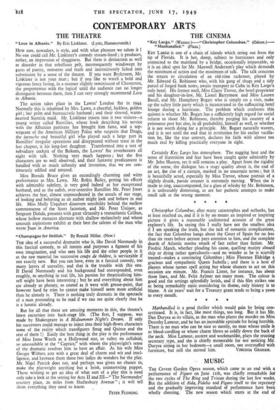CONTEMPORARY ARTS
THE THEATRE
"Love in Albania." By Eric Linklater. (Lyric, Hammersmith.) How rare, nowadays, is style, and with what pleasure we salute it I No one could call Mr. Linklater's comedy stream-lined ; it produces, rather, an impression of shagginess. But there is distinction as well as disorder in that rebellious pelt, inconsequently windswept by gusts of poetry, nonsense and truth and intermittently licked into submission by a sense of the theatre. If you want Brykreem, Mr. Linklater is not your man ; but if you like to watch a bold and vigorous fancy fusing, in a manner slightly reminiscent of Chesterton, the preposterous with the logical until the audience can no longer distinguish between them, then I can very strongly recommend Love in Albania.
The action takes place in the Lawns' London flat in 1944. Normally this is inhabited by Mrs. Lawn, a cheerful, feckless, golden
girl; prim and bureaucratic husband ; and their shrewd, warm- hearted Scottish maid. Mr. Linklater injects into it two visitors—a young writer called Ramillies, whose book describing his service with the Albanian partisans has brought him fame, and a top- sergeant of the American Military Police who suspects that Draga, the farouche and beautiful girl who played such a large part in Ramillies' irregular operations and disappeared without trace in the last chapter, is his long-lost daughter. Transformed into a sort of subsidiary cockpit of the Balkans, the Lawns' flat reverberates all night with talk. Nothing very much happens ; but the five characters are so well observed, and their fantastic predicament is handled with so much urbanity and invention, that we are con- tinuously edified and amused.
Miss Brenda Bruce gives an exceedingly charming and witty performance as Mrs. Lawn. Mr. Robin Bailey, getting his effects with admirable subtlety, is very good indeed as her exasperated husband, and as the oafish, over-assertive Ramillies Mr. Peter Jones achieves the feat, almost unprecedented in the annals of our stage, of looking and behaving as an author might look and behave in real life. Miss Molly Urquhart discovers sensibility behind the mellow commonsense of the Scots factotum, and Mr. Peter Ustinov, as Sergeant Dohda, presents with great virtuosity a transatlantic Caliban, whose hollow menaces alternate with shallow melancholy and whose uncouth aspirations exhibit at their best the talents of the man who wrote 7uan in America.






































 Previous page
Previous page